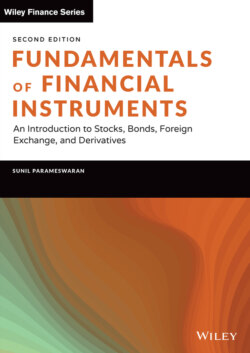Читать книгу Fundamentals of Financial Instruments - Sunil K. Parameswaran - Страница 29
На сайте Литреса книга снята с продажи.
DEBT SECURITIES
ОглавлениеA debt instrument is a financial claim issued by a borrower to a lender of funds. Unlike equity shareholders, investors in debt securities are not conferred with ownership rights. These securities are merely IOUs (an acronym for “I Owe You”), which represent a promise to pay interest on the principal amount either at periodic intervals or at maturity, and to repay the principal itself at a prespecified maturity date.
Most debt instruments have a finite lifespan, that is, a stated maturity date, and hence differ from equity shares in this respect. Also, the interest payments that are promised to the lenders at the outset represent contractual obligations on the part of the borrower. This means that the borrower is required to meet these obligations irrespective of the performance of the firm in a given financial year. Quite obviously, it is also the case that in the event of an exceptional performance, the borrowing entity does not have to pay any more to the debt holders than what was promised at the outset. It is for this reason that debt securities are referred to as fixed income securities. The interest claims of debt holders have to be settled before any residual profits can be distributed by way of dividends to the shareholders. Also, in the event of bankruptcy or liquidation, the proceeds from the sale of assets of the firm must be used first to settle all outstanding interest and principal. Only the residual amount, if any, can be distributed among the shareholders.
While debt is important for a commercial corporation in both the public and private sectors of an economy, it is absolutely indispensable for central or federal, state, and local (municipalities) governments when they wish to finance their developmental activities. Although such entities can raise resources by way of taxes, and in the case of the federal government by printing money, they obviously cannot issue equity shares. For instance, a US citizen cannot become a part owner of the state of Illinois.
Debt instruments can be secured or unsecured. In the case of secured debt, the terms of the contract will specify the assets of the firm that have been pledged as security or collateral. In the event of the failure of the company, the security holders have a right over these assets. In the case of unsecured debt securities, the investors can only hope that the issuer will have the earnings and liquidity to redeem the promise made at the outset. In the United States, secured corporate debt securities are known as bonds, while unsecured debt securities issued by corporations are termed as debentures. In certain countries the terms bonds and debentures are used for both categories of debt securities. Also, the world over, government debt securities are known as bonds.
Debt instruments can be either negotiable or nonnegotiable. Negotiable securities are instruments which can be endorsed from one party to another, and hence can be bought and sold easily in the financial markets. A nonnegotiable instrument is one which cannot be transferred. Equity shares are obviously negotiable securities. While many debt securities are negotiable, certain loan-related transactions, such as loans made by commercial banks to business firms and savings bank accounts of individuals, are examples of assets that are not negotiable.
Debt securities are referred to by a variety of names such as bills, notes, bonds, debentures, etc. US Treasury securities are fully backed by the federal government, and consequently have no credit risk associated with them. The term credit risk refers to the risk that the issuer may default or fail to honor their commitment. Thus, the interest rate on Treasury securities is used as a benchmark for setting the rates of return on other, more risky securities. The US Treasury issues three categories of marketable debt instruments – T-bills, T-notes, and T-bonds. T-bills are discount securities also known as zero-coupon securities. That is, they are sold at a discount from their face value, and do not pay any interest. They have a maturity at the time of issue that is less than or equal to one year. T-notes and T-bonds are sold at face value and pay interest periodically. A T-note is akin to a T-bond but has a time to maturity between 1 and 10 years at the time of issue, whereas T-bonds have a life of more than 10 years.
